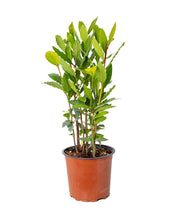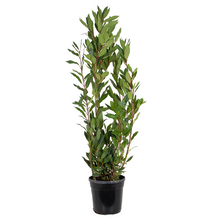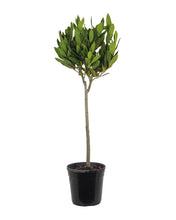Laurus nobilis, commonly known as bay laurel, sweet bay, or simply bay, is an aromatic evergreen tree or large shrub prized for its fragrant leaves and culinary uses. This plant features dark green, lance-shaped leaves with a smooth, leathery texture. It produces small, yellow flowers in spring, followed by black berries in autumn. Bay leaves are widely used in cooking to add flavor to soups, stews, sauces, and other dishes. It belongs to the Lauraceae family.
Origin: Laurus nobilis is native to the Mediterranean region.
Light: Laurus nobilis thrives in full sun to partial shade. It prefers at least 6 hours of sunlight per day, but in hotter climates, it may benefit from some afternoon shade.
Water: Allow the soil to dry out slightly between waterings. Water thoroughly when you do water, ensuring any excess drains away. Overwatering can lead to root rot.
Soil: Laurus nobilis prefers well-drained soil. It can tolerate a range of soil types, but thrives in fertile, loamy soil.
Fertilising: Feed your Laurus nobilis with a balanced slow-release fertiliser in spring.
Pruning: Laurus nobilis can be pruned to shape or maintain size. It responds well to pruning and can be shaped into hedges, topiaries, or even standards.
Harvesting: Bay leaves can be harvested year-round. Pick fresh leaves as needed or dry them for later use. To dry bay leaves, hang them in bunches in a cool, dark, and well-ventilated place.
Uses: Bay leaves are a staple in many cuisines, adding a distinctive flavor to soups, stews, sauces, and meat dishes. They are also used in potpourris and wreaths.
Toxicity: Laurus nobilis is generally considered non-toxic to humans and pets. However, the leaves can be sharp, so it's best to keep them away from children and pets who might try to eat them.





